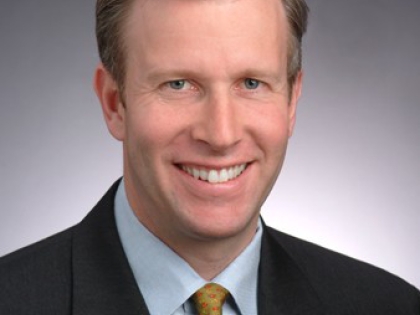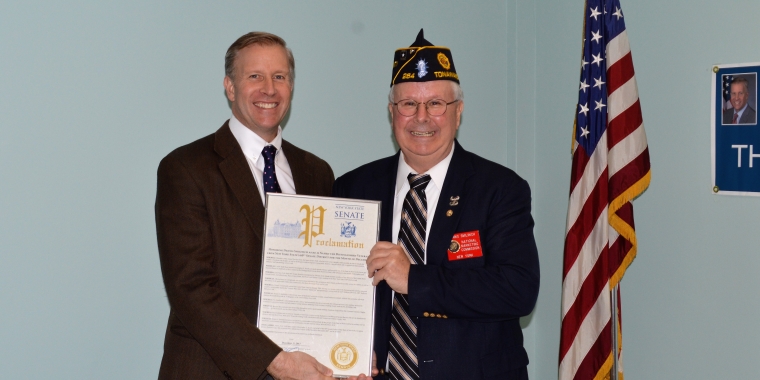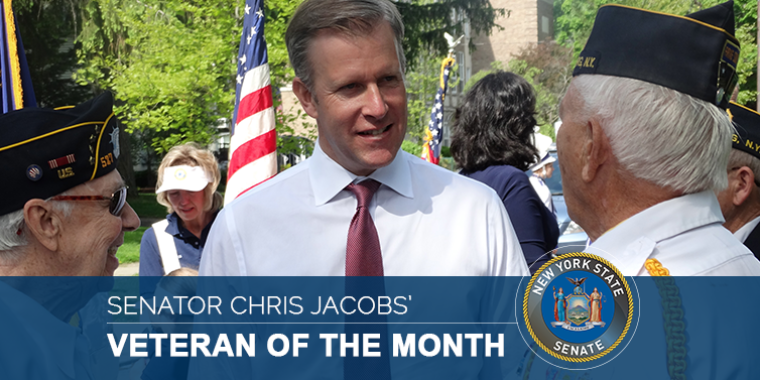
Jacobs Announces Passage of State Budget
Senator Chris Jacobs
April 9, 2017
-
ISSUE:
- State budget
- Ridesharing
- EDUCATION FUNDING
- Infrastructure and Capital Investment
- Senior Issues
(Albany, NY) – New York State Senator Chris Jacobs (60th SD) announced the passage of the 2017-2018 New York State Budget, noting that the $153 billion spending plan resulted in the state living within its means and prioritizing spending to ensure equity for all New Yorkers.
“The budget that was ultimately approved rejected hundreds of millions of dollars in new taxes and fee increases, and protects hardworking taxpayers through the extension of last year’s historic $4.2 billion middle class income tax cut,” said Senator Jacobs. “Equally important, rejecting those tax and fee increases helps us to maintain our competitiveness and affordability as we continue to advance the economic recovery underway in our region,” Jacobs added.
The continuation of the middle class tax cut approved last year will mean a reduction in rates of 20 percent, and middle class families will see their lowest income tax rates in 70 years.
For his part, Senator Jacobs was pleased with the victories for Buffalo and Western New York that made it into the final budget. Noting that parity in the distribution of state resources was a primary objective of his going into the budget process, Jacobs highlighted some of the priorities that he fought for during negotiations:
Bringing Ridesharing to Buffalo & Western New York – A top priority for Jacobs, the state budget expands ridesharing outside New York City. After a 90 day period for the state to develop a regulatory framework, ridesharing companies like Uber and Lyft will be able to begin operations and provide Western New Yorkers with a safe and convenient transportation alternative.
Buffalo Billion II - $500 million dollars to support a second phase of economic development stimulus spending for Buffalo and Western New York. Examples of projects proposed for the phase two spending include creation of a $10 million workforce development fund for training initiatives, a combined $25 million for strategic advanced manufacturing and health & life sciences projects, relocating Buffalo Manufacturing Works to the Northland Corridor and the extension of the Metro Rail to the DL&W Terminal and redevelopment of the building and surroundings.
Education Funding – Increases state education aid by $1.1 billion. School aid will total more than $25.8 billion in the coming year, the largest commitment ever to public education. This includes an unprecedented increase of $700 million in Foundation Aid that will benefit our local school districts.
Workers Compensation Reform – The most significant worker’s compensation reform in over a decade will provide businesses, local governments and not-for-profits major savings, including rebates this year, while enhancing protections for injured workers. Reforming temporary benefit timelines is expected to reduce employer contributions approximately $350 million annually. The budget requires updating the impairment for loss of use awards, the first time these have been updated in decades, to reflect advances in modern medicine which produce better outcomes. It is anticipated that these new guidelines will save employers hundreds of millions of dollars each year.
Huntley Closure Mitigation Funding – Successfully amended language that increases the reimbursement percentages, extend the reimbursement timeframe from five years to seven, and provides an additional $15 million under the state’s power generation mitigation fund. These changes will mean approximately $5.4 million in combined additional revenue to the Ken-Ton School District, the Town of Tonawanda and Erie County.
Combatting Heroin and Opioid Abuse – As a Co-Chair of the Heroin and Opioid Task Force, Jacobs fought for and delivered $214 million – a record-high level of funding – to strengthen prevention, treatment, recovery and education services across the state, along with $100,000 for Save the Michaels of the World, Inc. in Western New York.
Clean Water Infrastructure - $2.5 billion to support water infrastructure programs statewide. This will include municipal grant programs for drinking water and wastewater replacement and repair, a rebate program for septic improvement or replacement projects and the creation of a new water mitigation and remediation program to allow for quick responses to drinking water emergencies.
Local Roads & Bridges – Significant commitment to rebuilding New York’s aging infrastructure through a $1.5 billion capital plan increase to accelerate road and bridge projects throughout the state. The Consolidated Highway Improvement Program (CHIP’s) is increased $65 million for a total of $503 million this year for local road and bridge projects. $50 million was added to the Local BRIDGE NY program bringing that total to $150 million, including $20 million for culvert projects.
Protecting Seniors – Ensuring the health of our seniors with $133 million to fully fund the Elderly Pharmaceutical Insurance Coverage (EPIC) Program, $50 million for the Expanded In-home Services for the Elderly Program, $31 million for Community Services for the Elderly Program and $27 million for the Wellness in Nutrition Program.
New Tax Relief for Working Parents - The budget includes $47 million in additional tax relief for working families’ child care expenses. The state’s Child and Dependent Care Tax Credit is expanded for taxpayers with incomes between $50,000 and $150,000 and the current cap on child care expenses would rise from $6,000 to a maximum of $9,000 (depending on the number of children) for families with up to five children.
Higher Education – Helping middle-class families afford college with more than $1.1 billion in Tuition Assistance Program (TAP) funding this year. Ensuring “student choice” with $19 million in aid available for an Enhanced Tuition Award initiative specifically designed for students at private colleges and universities. An additional $3.1 million in tuition assistance for part-time community college students was included to help working parents.
Fair Wages for Direct Care Professionals - $55.5 million in 2017-2018 to compensate direct care professionals who provide critical care and assistance to individuals with disabilities. This funding is critical to address salary gap and high turnover rates to ensure vulnerable citizens receive adequate care.
“I am very pleased that a final budget is now in place that accomplishes my two most important objectives heading into the budget process, addressing critical needs in our community while fighting to protect taxpayers,” Jacobs concluded.
Share this Article or Press Release
Newsroom
Go to NewsroomJacobs Honors Veteran of the Month Dennis Smilinich
December 12, 2017

Jacobs, Lyme Task Force, Seek to Develop Statewide Disease Protocol
December 8, 2017
Jacobs Bill Would Decrease Sewer Overflows Into Area Waterways
November 17, 2017
